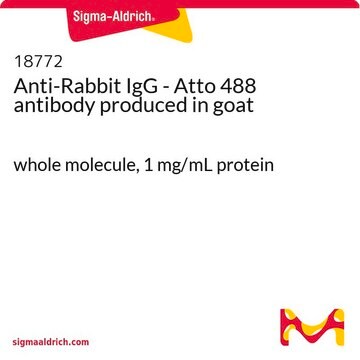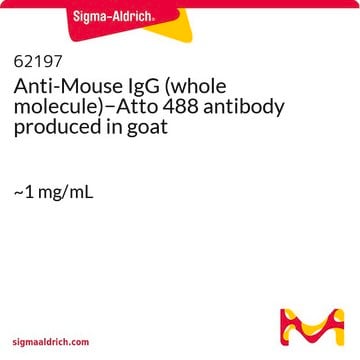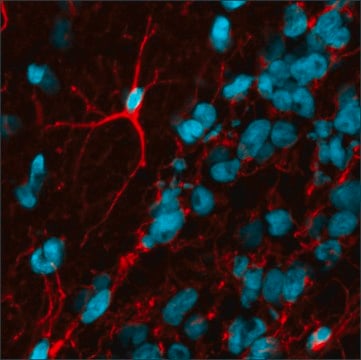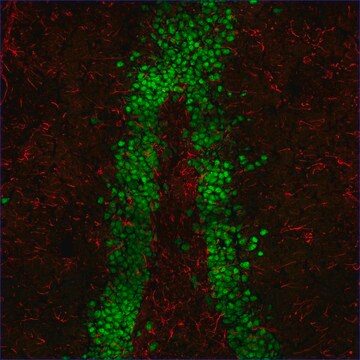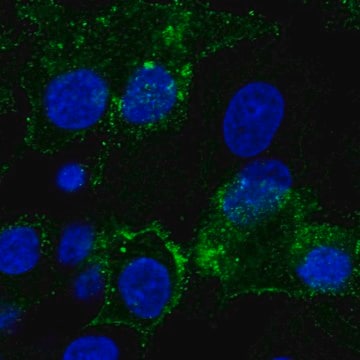General description
Immunoglobulin G (IgG) belongs to the immunoglobulin family and is a widely expressed serum antibody. An immunoglobulin has two heavy chains and two light chains connected by a disulfide bond. It is a glycoprotein and mainly helps in immune defense. IgG is a major class of immunoglobulin. Immunoglobulin G (IgG) participates in hypersensitivity type II and type III. Rabbit IgG is further divided into five classes- IgM, IgG, IgA, IgD and IgE. It has only one IgG variant with one interheavy disulfide bridge. It helps in opsonization, complement fixation and antibody dependent cell mediated cytotoxicity.
This product is prepared by labeling high quality F(ab′)2 fragment of goat anti-rabbit IgG (H+L) with the green fluorescent dye CF488A. CF488A is a superior alternative to the traditional green fluorescent dye FITC (or fluorescein) owing to its exceptional brightness and photostability. CF488A is comparably bright and photostable to Alexa Fluor 488. However, antibody conjugates prepared from CF488A are more specific than those prepared from Alexa Fluor 488 because CF488A, being minimally charged, does not significantly change the isoelectric points of antibodies as Alexa Fluor 488 does
Specificity
Binds with whole molecule rabbit IgG and the light chains of other rabbit immunoglobulins.
Immunogen
rabbit IgG (H+L)
Application
Anti-Rabbit IgG (H+L), CF™ 488A antibody has been used in western blotting and immunostaining.
Features and Benefits
Evaluate our antibodies with complete peace of mind. If the antibody does not perform in your application, we will issue a full credit or replacement antibody.
Learn more.Physical form
Supplied in phosphate buffered saline with 0.05% sodium azide, 50% glycerol and 0.2% BSA.
Preparation Note
Protect from light. The antibody solution should be gently mixed before use.
Legal Information
This product is distributed by Sigma-Aldrich Co. under the authorization of Biotium, Inc. This product is covered by one or more US patents and corresponding patent claims outside the US patents or pending applications owned or licensed by Biotium, Inc. including without limitation: 12/334,387; 12/607,915; 12/699,778; 12/850,578; 61/454,484. In consideration of the purchase price paid by the buyer, the buyer is hereby granted a limited, non-exclusive, non-transferable license to use only the purchased amount of the product solely for the buyer′s own internal research in a manner consistent with the accompanying product literature. Except as expressly granted herein, the sale of this product does not grant to or convey upon the buyer any license, expressly, by implication or estoppel, under any patent right or other intellectual property right of Biotium, Inc. Buyer shall not resell or transfer this product to any third party, or use the product for any commercial purposes, including without limitation, any diagnostic, therapeutic or prophylactic uses. This product is for research use only. Any other uses, including diagnostic uses, require a separate license from Biotium, Inc. For information on purchasing a license to use this product for purposes other than research, contact Biotium, Inc., 3159 Corporate Place, Hayward, CA 94545, Tel: (510) 265-1027. Fax: (510) 265-1352. Email: btinfo@biotium.com.
CF is a trademark of Biotium, Inc.
Disclaimer
Unless otherwise stated in our catalog or other company documentation accompanying the product(s), our products are intended for research use only and are not to be used for any other purpose, which includes but is not limited to, unauthorized commercial uses, in vitro diagnostic uses, ex vivo or in vivo therapeutic uses or any type of consumption or application to humans or animals.
